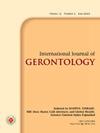哪些日本老年人最不可能享受良好的饮食习惯
IF 0.3
4区 医学
Q4 GERIATRICS & GERONTOLOGY
引用次数: 1
摘要
背景:随着日本进入超老龄化社会,通过良好的老年饮食习惯延长健康预期寿命成为抑制政府医疗支出快速增长的重要政策议程。我们阐明了社区居住老年人饮食习惯与家庭结构之间的全面关系。方法:从2012年日本内阁府在全国范围内开展的《2012年食品与营养教育态度调查》中获取65岁以上老年人饮食习惯的个人数据。我们对483个有效被调查者的数据进行了有序逻辑回归。结果:在按家庭组成和性别分开的受访者中,单身男性的饮食习惯最不受欢迎。虽然关于家庭组成的大多数参数都很重要,但与单身男性相比,单身女性没有明显的结果。对可能的协变量进行调整后发现,无论性别如何,独居的单身老年人不太可能(a)追求均衡的饮食习惯,(b)遵循均衡的饮食,(c)尝试享受用餐,或(d)享受用餐。除了家庭结构外,主观健康状况和食物知识对日本社区老年人的饮食习惯也有显著影响。然而,主观经济地位和居住地并不是显著的预测因子。结论:不良的饮食习惯会对独居的单身老年人,尤其是单身老年男性产生重大影响。本文章由计算机程序翻译,如有差异,请以英文原文为准。
Which Japanese Older Adults are Least Likely to Enjoy Favorable Dietary Practices
Background: With Japan becoming a super-aged society, extending healthy life expectancies resulting from favorable dietary practices in old age becomes an important policy agenda to curb the rapid increase in government healthcare expenditures. We clarify the comprehensive relationship between dietary practices among community-dwelling older adults and family structure. Methods: Individual data on dietary practices of older adults aged over 65 were obtained from the 2012 Survey of Attitudes toward Shokuiku (Food and Nutrition Education), which was conducted nationwide by the Cabinet Office of Japan in 2012. We applied ordered logistic regression for 483 valid respondents' data. Results: Among respondents separated by family composition and gender, dietary practices were found to be least favorable among single men. Although the majority of parameters regarding family composition were significant, no significant results were seen among single women, as compared to single men. Adjusting for possible covariates, it was found that irrespective of gender, single older adults living alone are less likely to (a) pursue well-balanced dietary habits, (b) follow a well-balanced diet, (c) attempt to enjoy eating meals, or (d) enjoy their meals. Besides family structure, subjective health status and knowledge regarding food significantly affect dietary practices among Japanese community-dwelling older adults. However, subjective economic status and place of residence were not significant predictors. Conclusion: Poor dietary habits can have significant consequences for single older adults, especially single old men, living alone.
求助全文
通过发布文献求助,成功后即可免费获取论文全文。
去求助
来源期刊
CiteScore
0.60
自引率
0.00%
发文量
0
审稿时长
6-12 weeks
期刊介绍:
The Journal aims to publish original research and review papers on all fields of geriatrics and gerontology, including those dealing with critical care and emergency medicine.
The IJGE aims to explore and clarify the medical science and philosophy in all fields of geriatrics and gerontology, including those in the emergency and critical care medicine. The IJGE is determined not only to be a professional journal in gerontology, but also a leading source of information for the developing field of geriatric emergency and critical care medicine. It is a pioneer in Asia.
Topics in the IJGE cover the advancement of diagnosis and management in urgent, serious and chronic intractable diseases in later life, preventive medicine, long-term care of disability, ethical issues in the diseased elderly and biochemistry, cell biology, endocrinology, molecular biology, pharmacology, physiology and protein chemistry involving diseases associated with age. We did not limit the territory to only critical or emergency condition inasmuch as chronic diseases are frequently brought about by inappropriate management of acute problems.

 求助内容:
求助内容: 应助结果提醒方式:
应助结果提醒方式:


